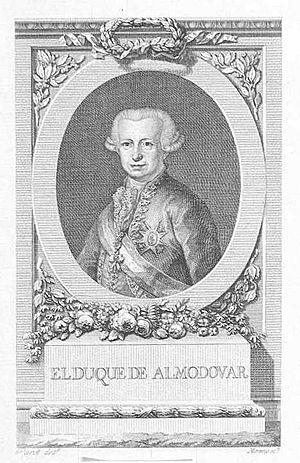Pedro Francisco de Luján y Góngora, 1st Duke of Almodóvar del Río facts for kids
Pedro Francisco Jiménez de Góngora y Luján (born 1727, died 1794) was an important person from Spain. He was a nobleman, which means he came from a powerful and old family. He also worked as an Ambassador, representing Spain in other countries. Besides that, he was a talented writer. He became the first Duke of Almodóvar del Río.
Contents
His Life and Work
Pedro Francisco Jiménez de Góngora was born into a noble family in Córdoba, Spain. He inherited the title of the 7th Marqués de Almodóvar del Río. This made him a very important person in Spanish society.
In 1779, he was given the special title of a Grandee of Spain. This was a high honor given by the King. On July 11, 1780, King Charles III of Spain made him the 1st Duke of Almodóvar del Río.
He also led the Real Academia de la Historia (Royal Academy of History). He was its fourth director from 1792 until his death in 1794.
Working as an Ambassador
Pedro Francisco Jiménez de Góngora served his country as an ambassador in several places.
- From 1759 to 1763, he was an ambassador in Russia.
- From about 1765 to 1778, he worked as an ambassador in Portugal.
- In 1778, he became the ambassador to London, England.
However, he had to leave his job in London the next year. This was because of disagreements with the British government. These problems were related to the American War of Independence. In 1789, he was chosen as an honorary member of the American Academy of Arts and Sciences. This showed how respected he was around the world.
Around 1751, he met a Spanish traveler named Antonio Ponz. This meeting happened when Góngora was living in the Kingdom of Naples. At that time, Naples was ruled by King Charles VII of Naples, who later also became King of Spain.
His Writings
Pedro Francisco Jiménez de Góngora was also a writer. He used different names when he published his works.
Spreading New Ideas
In 1781, he published ten letters under the name Francisco María de Silva. These letters were called "State of contemporary literature in France." They included his thoughts on the works of the famous writer François Marie Arouet Voltaire. This book helped to spread new ideas in Spain. These ideas were part of a movement called Encyclopedism. This movement encouraged people to learn about many different subjects.
Translating and Adding His Own Thoughts
A French writer named Abbé Guillaume Thomas François Raynal wrote a book in 1770. It was about how European countries colonized other lands. Raynal's book suggested that Spanish civilization had a negative impact on these lands.
Pedro Francisco Jiménez de Góngora decided to translate this book into Spanish. He used the name Eduardo Malo de Luque for this project. His Spanish version was called "Political History of the Overseas Establishments of European Nations." He also added his own thoughts, calling them "Comments of a Catholic Spaniard."
He planned to translate twelve volumes, but he only finished five. The Count of Floridablanca stopped him from publishing any more.
Extra Sections in His Books
Góngora added some unique parts to his translated work.
- The first two volumes followed Raynal's original plan. But Góngora added a large section about "The English Constitution and the Affairs of the English East India Company." This part was not in Raynal's original book.
- In the third volume, he included a long essay. It was about "The Political and Economic State of France."
- In the fourth volume, he added a special section. It was called "Analytical Memoirs Relative to the History and Present State of Russia." He wrote this using information and memories from his time as an ambassador in Russia.
See also
 In Spanish: Pedro de Góngora y Luján para niños
In Spanish: Pedro de Góngora y Luján para niños


